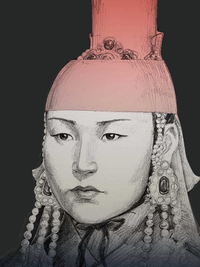Sivangi: Difference between revisions
mNo edit summary |
mNo edit summary |
||
| Line 34: | Line 34: | ||
Having obtained an expansive but unwieldy and greatly mismanaged realm, Tosui set about enacting great political, economic and administrative changes to the court and the realm. Reforming laws governing everything from society and education to taxation and criminal law, she transformed the Burkhanate from a steppe khanate into a unified empire. She was a distinguished poet, and was the first Burkhan to master the {{wp|Persian language|Poumeranian language}}. She also became a great patron of culture, overseeing the height of the Burkhanate in its artistic, literary and architectural endeavours, as well as funding numerous building projects in Khoraman such as [[Bagaridai Palace]]. | Having obtained an expansive but unwieldy and greatly mismanaged realm, Tosui set about enacting great political, economic and administrative changes to the court and the realm. Reforming laws governing everything from society and education to taxation and criminal law, she transformed the Burkhanate from a steppe khanate into a unified empire. She was a distinguished poet, and was the first Burkhan to master the {{wp|Persian language|Poumeranian language}}. She also became a great patron of culture, overseeing the height of the Burkhanate in its artistic, literary and architectural endeavours, as well as funding numerous building projects in Khoraman such as [[Bagaridai Palace]]. | ||
In 1251, after reigning for 36 years, 22 of them as Burkhan, Tesui was killed in relatively unclear circumstances. She is believed to have been ambushed and | In 1251, after reigning for 36 years, 22 of them as Burkhan, Tesui was killed in relatively unclear circumstances. She is believed to have been ambushed and executed by her nephew [[Taragai]] near Khoraman, though the reasons are uncertain. She was succeeded by another nephew, [[Buri Khan]]. Despite having worked to strengthen and solidify the Burkhanate, the issues surrounding her death, including the issue of succession, having been unsettled during her reign, would lead to the [[Burkhanate#Disintegration|rapid disintegration of the empire]]. | ||
==Early life and marriage== | ==Early life and marriage== | ||
Revision as of 01:07, 1 April 2020
| Tosui | |
|---|---|
 | |
| Khan of the Burkhanate | |
| Reign | 1215-1251 |
| Predecessor | Sain Khan |
| Successor | Buri Khan |
| Born | Tuya 1200 Khoraman, Burkhanate |
| Died | 1251 |
| Spouse | Sain Khan |
| Issue | |
| Dynasty | Eljigin |
| Father | Khabichi |
| Mother | Sarangerel |
| Religion | Navdarism |
Tosui (Tosüi), also known as Tosui Khan and initially as Tuya Khatun, was a Khamag ruler of the Burkhanate from 1215 to 1251. Described as the Lionness of Khoraman, Tosui was noted in her lifetime for her military skills, intelligence, and tactful diplomacy. She was often described by contemporaries as a beautiful but cruel and manipulative figure.
Tuya entered court at the age of 10, her family the Eljigins having migrated to Poureman with Toghon Khan. At the age of 12 she was married to Sain Khan, her elder by three years, and at 13 became the Khatun when he ascended to the throne. When Sain Khan died in 1215 Tuya was named regent for her unborn child, though real power was vested in her uncles Khaidu and Bukidai. Internal court strife and a rebellion in 1219 allowed her to wrest control from her uncles. The death of her son Bagaridai in 1227 led to a civil war between Tuya and Daritai for the throne, with Tuya defeating Daritai in 1229. Tuya claimed the title of Burkhan and took the name Tosui.
Tosui spent most of her early reign dealing with rebellions, both from disobedient vassal states, and from disgruntled nobles supporting Saljiud claimants for the throne. Her position was not secure until 1235 with the death of Jirghadai and the collapse of the Saljiud cause. After this, Tosui became a prominent monarch in West Catai, presiding over the political and military zenith of the Burkhanate. She proved herself a military capable and energetic commander, personally leading Burkhanate armies in conquering large areas of Poureman, and leading expeditions into Veleaz and Northern Majula. By the time of her death the Burkhanate had doubled in size and boasted one of the most advanced militaries in the world.
Having obtained an expansive but unwieldy and greatly mismanaged realm, Tosui set about enacting great political, economic and administrative changes to the court and the realm. Reforming laws governing everything from society and education to taxation and criminal law, she transformed the Burkhanate from a steppe khanate into a unified empire. She was a distinguished poet, and was the first Burkhan to master the Poumeranian language. She also became a great patron of culture, overseeing the height of the Burkhanate in its artistic, literary and architectural endeavours, as well as funding numerous building projects in Khoraman such as Bagaridai Palace.
In 1251, after reigning for 36 years, 22 of them as Burkhan, Tesui was killed in relatively unclear circumstances. She is believed to have been ambushed and executed by her nephew Taragai near Khoraman, though the reasons are uncertain. She was succeeded by another nephew, Buri Khan. Despite having worked to strengthen and solidify the Burkhanate, the issues surrounding her death, including the issue of succession, having been unsettled during her reign, would lead to the rapid disintegration of the empire.